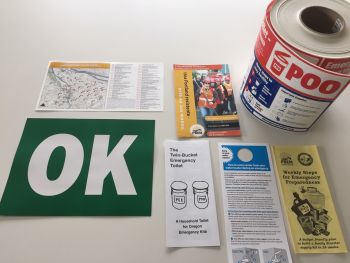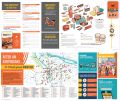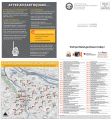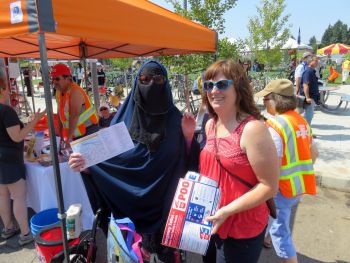Printed Community Handout Materials
Below is a table and gallery of in-print PBEM published handouts. PLEASE NOTE that "in-print" does not mean "in stock"; nor does it mean we currently have the resources to print new copies of out of stock handouts. All PBEM published materials are intended for public use and may be reprinted for free public use; commercial use is prohibited. Materials may not be altered for any reason.
| If you wish to request any of these materials, please do so at least two weeks before you need them. You can request materials by completing the ORDER FORM. |
Where possible, PBEM has had materials translated into other languages. For consistency, this page uses ISO 639-1 language abbreviations.
| In-Print Handouts | ||||||||||||||||
|---|---|---|---|---|---|---|---|---|---|---|---|---|---|---|---|---|
| Handout | Last Update | |||||||||||||||
| PocketPrep | 2022.03.29 | en | es | |||||||||||||
| BEECN Postcards | 2022.05.26 | en | es | ru | vi | zh | ||||||||||
| Pee+Poo Bucket Stickers | 2022.02.14 | en | es | ko | ru | so | uk | vi | zh | |||||||
| 24-Week Family Preparedness Shopping List | 2022.06.29 | en | es | |||||||||||||
| Water Storage/Treatment Postcards | 2022.05.25 | en | es | ar | hi | ja | kar | km | lo | ko | ne | ru | so | vi | zh | |
| Water Heater Hang Tags | 2022.05.25 | en | es | ar | hi | ja | kar | km | lo | ko | ne | ru | so | vi | zh | |
| Pet Safety Window Cling | 2022.07.20 | en | ||||||||||||||
| NET Brochure | 2016.11.26 | en | es | ru | vi | |||||||||||
- PBEM in-print handouts; click image to enlarge.
PocketPrep
PocketPrep is the flagship of our mighty fleet of informational handouts. The PocketPrep was designed and printed with the following considerations in mind:
- Reduce the number of handouts PBEM prints to a single piece. We were only moderately successful on that, but it did reduce four handouts down to one.
- Create something that recipients want to hang onto instead of recycling. This was done with eye catching design and providing space for for people to write in information. The design worked well enough that Z-CARD North America uses PocketPrep as a product sample for getting emergency prep communications into peoples' hands.
- Make it durable. PocketPreps are printed on waterproof, tear-resistant paper.
- Make it portable. Unfolded, it measures about 23" x 9". But it folds down to the size of a credit card.
There are a few production drawbacks, however:
- They're expensive...about $1.50 a piece. That means we need to encourage NETs and neighbors to have conversations with people about them instead of simply handing them out or dropping them on a table for people to take.
- The file design formats are challenging to edit; only a professional graphic designer would be able to do it. That can make updates and getting these translated into other languages difficult.
- That they are printed on durable paper means that folks can only write on them using ballpoint pen or a pencil (gel ink slides right off).
- So far, we've only found one vendor who can print them cost effectively (Z-CARD).
Specifications
Printed, foldable information brochures with outer cards. Outer Cards: 3 ⅜” X 2 ⅛” – 18 pt C1S Board with Gloss coating. Inner Sheets: 23 ¼ ” X 9 ¼” – .0042” Polyart Synthetic text paper. Colors: Outers: 4/0, Inners: 4/4. Illustrations were completed by Hugh Newell. Krista Gust with the Portland Bureau of Planning and Sustainability completed layout and graphic design.
Appropriate Use
Because of their cost and our interest keeping material out of the waste stream, PocketPrep was designed not to be a typical government hand-out-and-toss piece of swag. Having a conversation about PocketPrep with someone is just as important as getting it into someone's hands. Therefore, requests for quantities of PocketPrep will also include one-sheets that explain to volunteers how they should distribute PocketPreps. .You can download a PDF of the instructions HERE..
We estimate it takes 45 seconds to one minute to explain PocketPrep to people. So if someone orders 120 pieces for a tabling event that last one hour, PBEM is only going to give 50 or so.
The "PocketPrep Instructions" read like this:
| PocketPrep Instructions
Thank you for helping us promote community resilience through outreach! This sheet is intended to offer some guidance on talking with folks about the PocketPrep handout, and disaster preparedness.
|
Project history
PBEM debuted the PocketPreps on August 18, 2019. After a few months of design work and stakeholder vetting/feedback, PBEM ordered the first print run (partially funded by the UASI 16 grant) in May 2019, for August delivery. The initial run proved popular and prompted a second run in March 2020, but the COVID-19 pandemic effectively shut down opportunities to distribute PocketPrep from March 2020 to 2022. PBEM wouldn't order another run until August 2023 (also funded by a UASI grant). It was this third print run that debuted PocketPrep in Spanish. In early 2023, the text of the PocketPrep was translated into Vietnamese and Simplified Chinese as well. However, PBEM has so far been unable to fund a print run of PocketPreps in those languages.
BEECN Postcards
The PocketPrep has a BEECN map on one side. But these postcards continue to be popular, so PBEM continues to print them in multiple languages.
Specifications
Printed double sided and full color CYMK on Accent Opaque 80# cover card stock. Finishing size is 11 ½" x 6 ⅛". Approximately $.50 per piece at last print run in May 2022; reference P&D order #1240552. Krista Gust with the Portland Bureau of Planning and Sustainability completed layout and graphic design.
Appropriate Use
PBEM is OK with simply handing these out casually. But when possible, outreach volunteers use the postcard to engage with someone about where their closest BEECN in, and then mark the location for the person to take home and stick it on the refrigerator. This works even better when a large map of the neighborhood is available at the table.
Project History
The first run of BEECN postcards were mailed to every household in Portland in early December of 2012 and mentioned in a December 11, 2012 PBEM press release announcing the debut of the BEECN program. The total mailing cost arrived at approximately $60,000 (printing costs were $13,860.95 according to P&D order #1123433; postage costs unclear). However, as the postcards landed in residential mail the same time as seasonal junk mail and holiday catalogs, the postcard was widely (though anecdotally) reported to have met the same fate of those mailers: tossed in a recycling bin with barely a passing glance. It did not make the impression hoped for.
Pee+Poo Bucket Stickers
The following text is quoted or paraphrased from the Emergency Toilet Project website. The Emergency Toilet Project is a project of the Regional Disaster Preparedness Organization (RDPO):
Several recent disasters in the United States have caused damage to portions of water and wastewater systems, leaving major metropolitan areas without access to clean water and flushable toilets for prolonged periods. Emergency managers, among others, have recognized a need to improve post-disaster sanitation management and educate communities on how best to manage human waste.
The stickers are not to be used for commercial purposes. Anyone may use the materials for non-commercial purposes, as long as they site the source: "Regional Disaster Preparedness Organization of the Portland Metropolitan Region, with funding from the U.S. Department of Homeland Security/Urban Areas Security Initiative (UASI) grant program."
Specifications
PBEM does not publish this handout, but we place orders for them with our regional partners. Finishing size of each sticker is 13 ¼" x 8 ¼". Graphic was composed in Adobe Illustrator.
Appropriate Use
The stickers were designed to be printed as stickers and placed on poo and pee buckets (the buckets should be two separate buckets). You can also print them on card stock or regular paper and use packing tape to affix them.
Project History
In 2016, Sue Mohnkern of Washington County Public Health (in Oregon) led the RDPO’s Regional Disaster Sanitation Task Force to develop guidelines for disaster sanitation following a Cascadia Subduction Zone Earthquake. In 2017, the technical content created by that task force was passed to the RDPO’s Regional Disaster Preparedness Messaging Task Force under the initial leadership of Felicia Heaton, formerly of Portland Bureau of Emergency Management, and then Cynthia Valdivia, a bilingual outreach and multicultural public educator with Washington County Public Health.
With the help of an Urban Areas Security Initiative (UASI) grant, the RDPO hired Portland-based consulting firm Barney and Worth to help transform the disaster sanitation guidelines into pre- and post- event educational tools.
24-Week Family Preparedness Shopping List
This is probably the most popular PBEM-published handout. It gives recipients an opportunity to incrementally engage with disaster preparedness, and build a sufficient kit in 24 weeks.
Specifications
Tri-fold printed double-sided and full color CYMK. Finishing size is 11" x 8 ½". Illustrations by Hugh Newell; graphic design and layout by Hexad Studios.
Appropriate Use
The handout itself is self-explanatory enough that leaving them as a "take one" item at a table or counter is appropriate. However, best practice is for an experienced NET to talk through some of the list with people. They may have questions about
Pet Safety Window Cling
Specifications
Material: clear RI-Cling printed face down for viewing through glass. Finishing size is 5" x 6". Full color CMYK. Designed in InDesign by Jeremy Van Keuren, artwork completed by Hugh Newell. Last print run in July 2022 had them at approximately $3.05 a piece.
NET Brochure
Specifications
Tri-fold printed double-sided and full color CYMK. Full bleed. Finished size is 11" x 8 ½". Printed on AEPP Mohawk Text-11. Photographs by Ethan Jewett; graphic design and layout composed in InDesign by Jeremy Van Keuren.
Retired Printed Community Handout Materials
The following materials are retired: out of print and out of stock. They cannot be requested from PBEM and PBEM will not do further print runs of them. They are published here in case a volunteer wants to download the files and have them printed.
OK/HELP Signs
The use case/intent with these signs is that they be distributed to residences. Following an earthquake or other disaster, someone in the home would place one of these signs in a window as a sign to search and rescue teams that help is needed or not needed.
PBEM discontinued print runs of this sign because of cost, and because their use case was illogical and possibly dangerous. For example, what if someone posted the "OK" sign immediately after an earthquake but was severely injured in an aftershock? Incoming disaster responders from around the country are also not trained or informed of their use; a rescuer brought in from another state probably wouldn't even realize that a "HELP" or "OK" sign had anything to do with the aftermath of a disaster. Multnomah County occasionally stocks these signs still, but PBEM does not.
Specifications: Print front and back. Finishing size is 11" x 8 ½". Original print runs were on a plastic coated card stock (not sure what exactly). DOWNLOAD.









